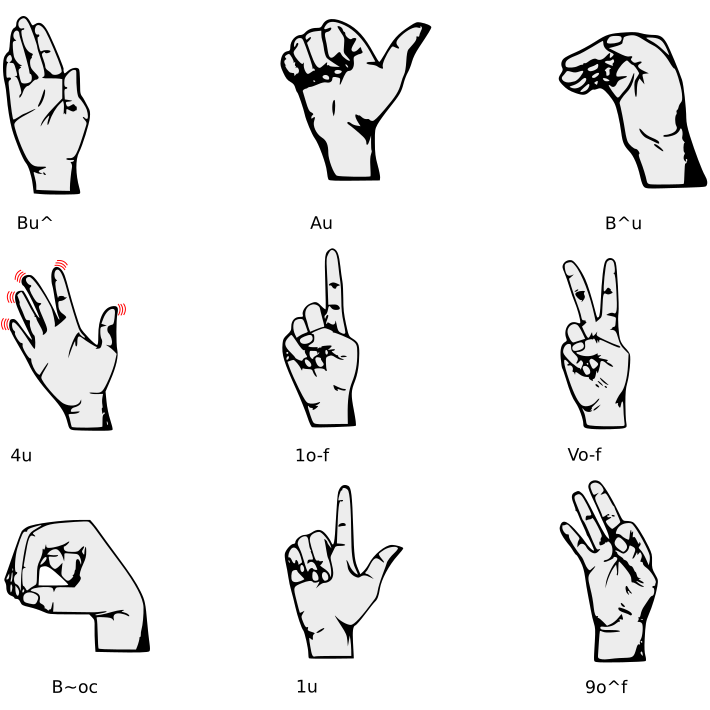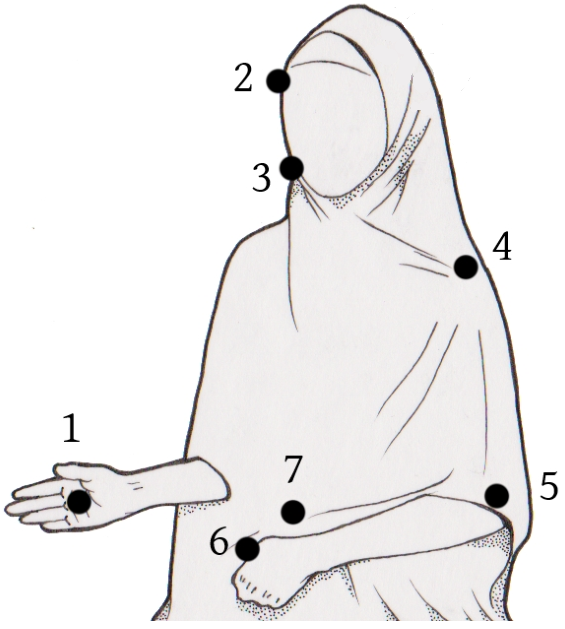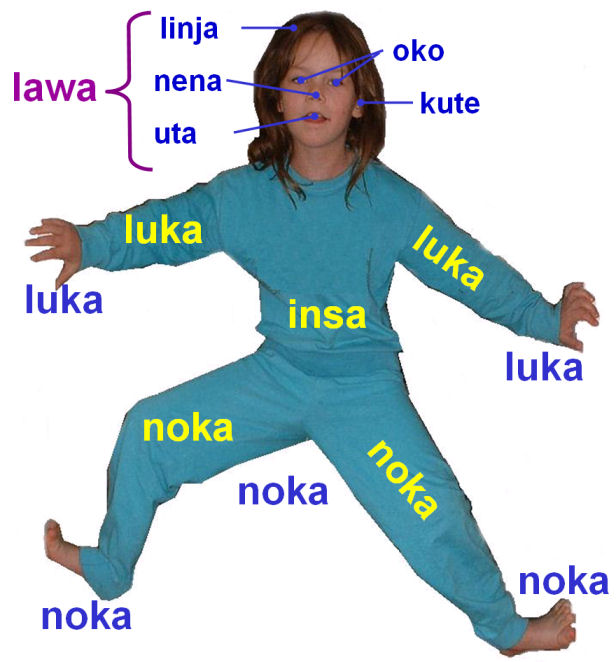The Toki Pona Baby Sign-Language Guide
Related pages: Flash Cards, Manifesto
- 0: Gestures
- 1: Basics
- 2: Descriptions
- 3: The World
- 4: Names, Shapes, and Colors
- 5: Body Parts
- 6: Commands and Desires
- 7: More
- 8: Beyond
0: Gestures
There are 4 elements to each Toki Pona gesture:
- hand shape
- location on the body
- palm orientation
- whether one or both hands

There are only 9 Toki Pona hand shapes:
- flat hand
- thumb-fist
- bent hand
- O-hand
- 1-hand
- 2-hand
- wiggling hand
- L-hand
- F-hand

There are 8 body locations:
- in front of chest
- at side of forehead
- at side of chin
- at left shoulder
- at left elbow
- on top of left fist
- on stomach
- under left slanted forearm
1: Basics
For baby sign-language, speak Toki Pona with your hands while speaking your native tongue (e.g. English) with your mouth. Your reusable gestures will become associated with spoken words. The goal is to create a minimal gesture vocabulary for bootstrapping speech.
8 words offer a surprising amount of contextual nuance:
| jaki | yucky, filth, garbage |
| ko | mush, paste |
| lape | sleep |
| len | clothes, fabric |
| moku | eat, drink, food, meal |
| pona | good, simple, clean |
| telo | liquid, wet, wash, water |
| tomo | home, house, room |
All Toki Pona words in this guide can be used as nouns, adjectives, and verbs.
To modify a Toki Pona word, add more words after it. With "liquid" (telo) and "cloth" (len), you can talk about wet clothes (len telo) and laundry detergent (telo len). Always use the first term as the main noun/verb and additional terms as the adjectives.
You can combine our 8 basic words into many concepts:
| jaki ko | poop | "mushy yucky" |
| jaki telo | pee | "liquid yucky" |
| len jaki | diaper, dirty clothes | |
| len lape | blanket, pajamas | "sleep fabric" |
| len moku | bib | "food fabric" |
| len pona | clean clothes | |
| len telo | damp clothes, swimwear | "wet clothes" |
| moku ko | mushy food, baby food | "mushy food" |
| moku telo | drink, liquid food, milk | "liquid food" |
| pona telo | wash, bathe, clean | "wet clean" |
| tomo jaki | bathroom, outhouse | "yucky room" |
| tomo lape | bedroom | "sleep room" |
| tomo len | closet, laundry area | "clothes room" |
| tomo moku | kitchen | "food room" |
| tomo pona | clean room | |
| tomo telo | boat |
In the beginning, only sign for immediate actions/objects. Don't sign "milk" unless you have milk in your hand. Do not gesture for desires or aspirations.
2: Descriptions
You can extract incredible mileage out of 15 words. In full Toki Pona, you have a specific word for sweets (suwi), but "fun food" (moku musi) allows you to recycle terms from an even smaller vocabulary.
| kalama | sound, noise |
| lete | cold, ice, uncooked |
| lili | small, short, young |
| musi | play, fun, art, toy |
| seli | hot, fire |
| suli | big, tall, old |
| supa | horizontal, table |
With 7 additional words, we achieve vast explanatory power:
| kalama lili | quiet | "small sound" |
| kalama musi | music | "fun noise" |
| kalama suli | loud | "big sound" |
| ko musi | clay, playdoh | "fun mush" |
| lape lili | nap | "small sleep" |
| len musi | costume | "fun clothes" |
| moku lete | cold food, uncooked food | |
| moku lili | small food | |
| moku musi | snack, candy, treat | "fun food" |
| moku seli | hot food, burnt food | |
| moku suli | big food | |
| moku telo seli | warm soup | "hot liquid food" |
| musi lili | small toys | |
| musi suli | big toys | |
| musi supa | crafts | "table fun" |
| musi telo | swim, water toys | "water fun" |
| musi tomo | dollhouse | "house toy" |
| supa lape | bed | "sleep surface" |
| supa moku | dinner table | "food surface" |
| supa musi | play table, iPad | "play surface" |
| supa seli | stove | "fire surface" |
| telo lete | cold drink, cold water | |
| telo seli | hot water | |
| telo seli | jacket, sweater | "hot clothes" |
| telo suli | ocean, lake, pool | "big water" |
| tomo lili | fort, crib, playpen | "small room" |
| tomo musi | play room, playpen | |
| tomo seli | oven | "hot room" |
| tomo suli | family room | "big room" |
Note that you can add multiple adjectives to a noun, e.g. "hot liquid-food" (moku telo seli). Each additional term applies to all the preceding words.
3: The World
With daily-life covered, extend your sights to the outside world:
| jan | person |
| ma | outdoors, land, soil |
| kasi | plant, tree, vegetation |
| suwi | sweet, candy, sugar |
| pan | bread, grain, dry cereal |
| kili | fruit, vegetable |
| akesi | reptile, creature |
| soweli | land animal, meat |
| kala | fish, sea creature |
| waso | bird, poultry |
| pipi | bug, insect, spider |
Here are some new combinations available from our added wordset:
| jan lili | small person, child | |
| jan pona | friend | "good person" |
| jan suli | big person, adult | |
| kalama jan | talking | "people noise" |
| kalama ma | nature sounds | |
| kalama musi jan | singing | "fun people-noise" |
| kalama soweli | "woof", "meow" | |
| kalama waso | bird sounds | |
| kasi kili suli | fruit tree | "big fruit plant" |
| kasi moku | vegetable | "edible plants" |
| kasi pona | flower | "good plant" |
| kasi suli | tree | "big plant" |
| ko ma | mud | "earth paste" |
| ma kasi | forest, jungle | |
| ma kili | orchard, garden, farm | |
| ma soweli | corral, ranch | |
| ma telo | beach, lakeside, wetland | |
| moku kala lete | sushi | |
| moku soweli | dogfood, catfood | |
| musi jan lili | doll | "small person-toy" |
| musi ma | play outside | "outside fun" |
| pan telo | cereal | "wet bread" |
| soweli moku | beef, pork, meat | "edible animals" |
| soweli pona | dog, cat, pet | "good land-animal" |
| telo jan | blood | "people liquid" |
| telo kili | juice | "fruit liquid" |
| telo ma | rain | "land water" |
| telo suwi | soda, soft-drink | |
| tomo soweli | doghouse, barn | |
| tomo waso | birdhouse, coop |
Again, Toki Pona has more nuanced words from its full vocabulary. But for baby sign-language, reuse a smaller number of terms. For example, use signs for "people noise" (kalama jan) over "talk" (toki).
4: Names, Shapes, and Colors
Toki Pona offers pronouns and people descriptors, but I suggest using names/titles instead. Create unique gestures for people's names (Toki Pona has an official way to do this, but it's not necessary). Instead of signing "me" (mi), gesture "person Dad" (jan Dad). Instead of saying "mother" (mama meli), say "person Mom" (jan Mom). Instead of gesturing "you" (sina), gesture "person __" (jan __). You can use your unique gestures to indicate possession or association. "My room" (tomo mi) could instead be "Dad room" (tomo Dad).
Create unique gestures for people's names, but reuse general descriptors for everything else. In order to maintain a laconic vocabulary, use shapes and colors to describe the world. Spaghetti is "string food" (moku linja). A banana is "long fruit" (kili palisa) or "long yellow fruit" (kili palisa jelo). Card games and origami can be described as "flat fun" (musi lipu). Playing catch is "spherical fun" (musi sike). Milk is "white liquid" (telo walo).
| sike | round, cycle, ball |
| lipu | flat thing, page, leaf |
| linja | string, hair, flexible |
| palisa | rod, stick, long thing |
| kiwen | rock, hard thing, metal |
| jelo | yellow |
| loje | red |
| laso | blue, green |
| walo | white |
| pimeja | black, dark, shadow |
| suno | light, sun |
5: Body Parts

Exploit innate proprioception to explain surroundings. Many objects have fronts (sinpin) and openings (uta) and bumps (nena) and legs (noka), just like you!
| insa | stomach, inside, between |
| kute | ear, listen, obey |
| lawa | head, mind, guide, lead |
| luka | arm, hand |
| monsi | back, behind, rear, butt |
| nena | nose, bump, button |
| noka | foot, leg, bottom, under |
| oko | eye, look, read, watch |
| poka | hip, side, next to, near |
| selo | skin, shell, outer layer |
| sewi | up, above, sky, top |
| sinpin | face, front, wall |
| uta | mouth, door, window, lip |
Your body offers an excellent reference for spatial awareness. Little people can be picked up (sewi) and set down (noka).
Body parts are also verbs! To kick is "to leg" (noka). To pick-up is "to hand" (luka).
And learning about your body naturally leads to insights about feelings and experience. Happiness is "good feeling" (pilin pona). Pain is "bad body" (sijelo ike).
| pilin | emotion, heart, feeling |
| sijelo | body, physical, torso |
6: Commands and Desires
Your baby will discover that they can request non-immediate things, i.e. future objects and distant objects. This is your cue to start using commands like "stop" (pini) and "away" (weka). You can also describe imminent events, e.g. "soon sleep" (lape kama).
But speak with with simple nouns and adjectives when possible. A "clean surface" (supa pona) is concrete; a "finished meal" (moku pini) is abstract.
Communicate consequences over opinions. "Mom is sad" (pilin ike Mom) carries more weight than "you are naughty" (sina ike).
| seme | what, why, how |
| wile | want, need, wish |
| tawa | go, moving, towards |
| weka | absent, away, ignored |
| awen | stay, wait |
| pini | done, quit, stop |
| ala | not, none, no |
| ike | bad, complicated |
7: More
These terms may be useful additions to your gesture vocabulary:
| esun | shop, business, purchase |
| mute | many, lots, more, much |
| nasa | strange, weird, drunk |
| pakala | broken, damaged, harmed |
| poki | bag, bowl, box, vessel |
| sitelen | image, symbol, writing |
8: Beyond
Toki Pona is a wonderful little language -- I've only scratched the surface in this short guide. If you'd like to go beyond baby sign-language, consider reading the official guide and the official dictionary. I also highly recommend watching Jan Misali's free Toki Pona lessons.